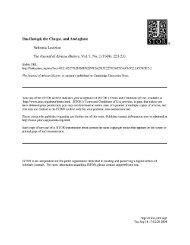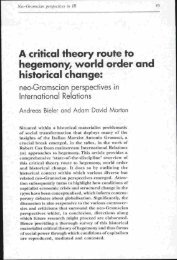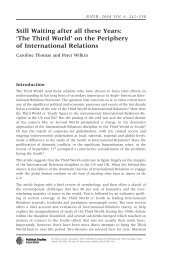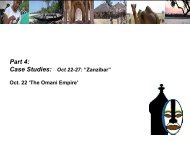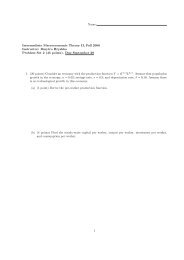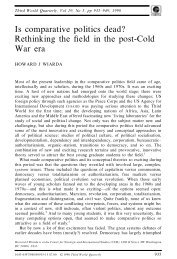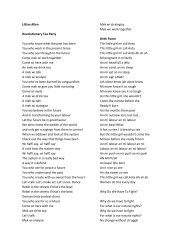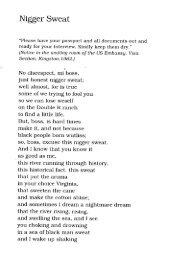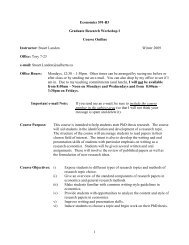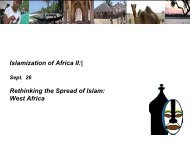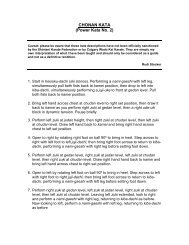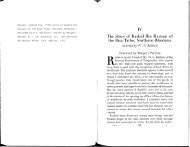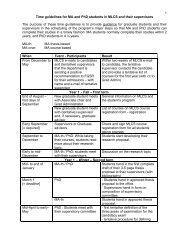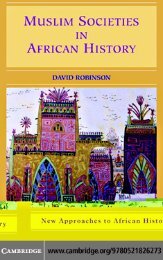personal memories revolutionary states and indian ocean migrations
personal memories revolutionary states and indian ocean migrations
personal memories revolutionary states and indian ocean migrations
Create successful ePaper yourself
Turn your PDF publications into a flip-book with our unique Google optimized e-Paper software.
information for the earlier period creates the impression of a sudden increase in<br />
Muslims in the nineteenth century when more Europeans were making their way<br />
there <strong>and</strong> reporting their findings. 11<br />
More importantly Trimingham seems to have set the agenda for the study<br />
of the relationship of Islam to Swahili identity as his one-way penetration of Islam<br />
argument appears to dominate historical studies. August Nimtz, another scholar of<br />
Islam in East Africa, disagrees with Trimingham’s claim that the presence of<br />
Europeans facilitated the spread of Islam, but not his assumption that there was a<br />
sudden <strong>and</strong> numerically significant increase in converts. He has a difficult time<br />
finding evidence for this new wave of Islam except in a few reports from frightened<br />
German administrators <strong>and</strong> one missionary who complained that the Muslims were<br />
impeding his efforts to recruit converts. Nevertheless, he asserts that the cause of<br />
this perceived rise in Muslim converts was the result of an ideological vacuum<br />
created by the German defeat of the Maji Maji rebellion. 12 He looks for various<br />
agents as well <strong>and</strong> finds that the turuq, the Sufi brotherhoods, have stepped in to fill<br />
the void.<br />
Nimtz’ thesis has led to much speculation about how the turuq<br />
accomplished their work. A favorite site for examination has been charisma, the<br />
<strong>personal</strong> power of individual Sufi saints to attract followers who swelled the ranks<br />
of the brotherhoods. François Constantin, drawing on an ethnography of Lamu<br />
society by Egyptian anthropologist Abdul Hamid M. el-Zein, 13 examined the life of<br />
one Sufi saint known to his followers as Habib Saleh to find the “seed” of this<br />
charisma. 14 Constantin decided that charisma resulted from a combination of<br />
<strong>personal</strong> (<strong>personal</strong>ity <strong>and</strong> power) <strong>and</strong> religious factors (his perceived link to the<br />
Prophet, baraka, defined by Constantin as Islamic knowledge, <strong>and</strong> his reputation as<br />
a scholar) with broader social factors (social upheaval). Habib Saleh was the right<br />
man in the right place at the right time. It seems that Constantin confirms Nimtz’<br />
assertion that Sufism somehow filled a void - in this case a need for stability during<br />
a period of political instability caused by European colonization.<br />
Another issue for Trimingham was the contrast between a “pure Islam”<br />
<strong>and</strong> “popular Islam.” This as Pearson notes in his Port Cities is a recurring theme<br />
throughout the history of Islam in Africa <strong>and</strong> elsewhere. R<strong>and</strong>all Pouwels takes up<br />
this theme in his Horn <strong>and</strong> the Crescent <strong>and</strong> adds to it the question of how Islam<br />
spreads. He talks about the “high Islam” of the Qur’an <strong>and</strong> the ulama (learned<br />
teachers) vs. “popular Islam,” <strong>and</strong> the Islam practiced by ordinary Africans. He<br />
locates the greater spread of Islam in a somewhat earlier period. For Pouwels, the<br />
arrival of Seyyid Said <strong>and</strong> his court in Zanzibar in the 1840’s is a key factor. He<br />
examines at length the changes brought about by the introduction of new “types”<br />
of ulama—the administrative types who brought literacy <strong>and</strong> a “higher” form of<br />
Islam <strong>and</strong> the charismatic types who gave rise to Sufi brotherhoods. In The Horn <strong>and</strong><br />
the Crescent, Pouwels’ version of penetration is one of depth rather than breadth.<br />
Although he notes that the appeal of these new ulama was for the most part “an<br />
elitist phenomenon,” he wants to ascribe agency to the charismatic Sufis whom he<br />
sees as somehow more “African” than “Arab.” Thus, in his recent article in the<br />
History of Islam in Africa, we find that the turuq have become the agents responsible<br />
for spreading Islam. At the same time, they are also the agents of a not-so-creative<br />
ethnic tension <strong>and</strong> conflict. 15<br />
It is not that these lines of enquiry are not interesting, even suggestive. It is<br />
more the case that this particular loop is not getting us beyond structural paradigms<br />
<strong>and</strong> debates about theological correctness that say little about the processes<br />
http://web.mit.edu/cis/www/mitejmes/<br />
11



